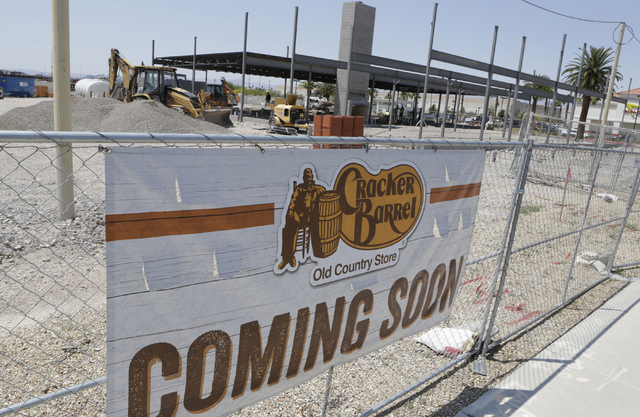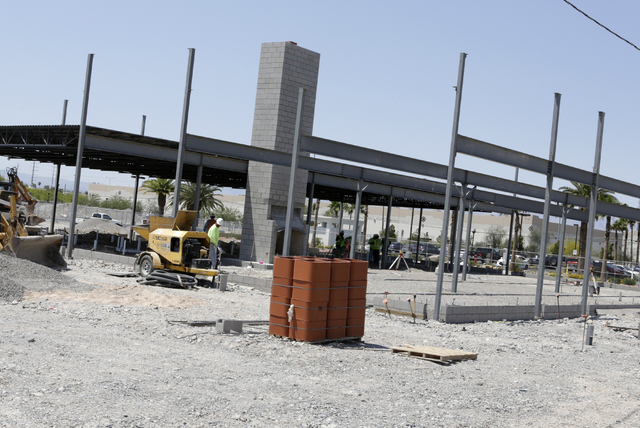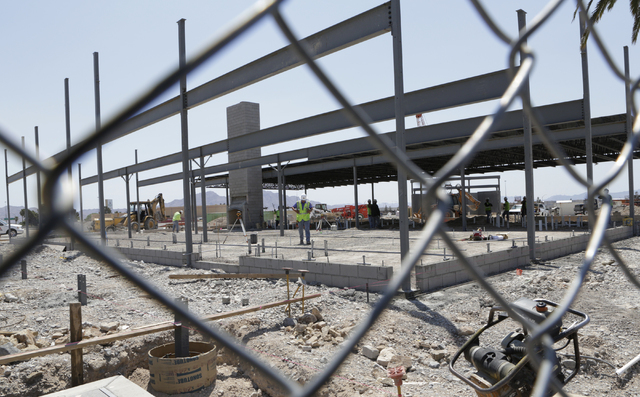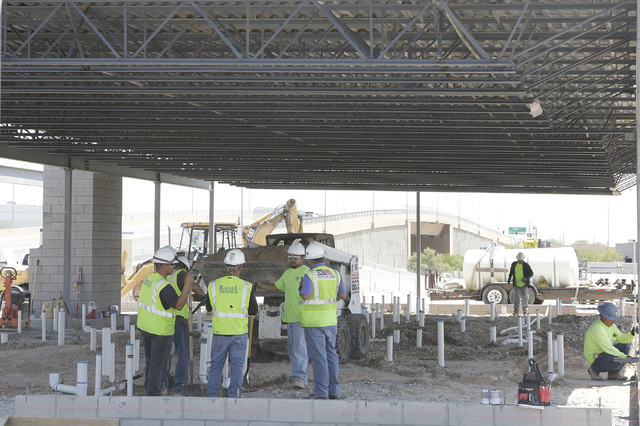North Las Vegas poised for financial comeback as business community grows in 2016
The ninth floor of North Las Vegas City Hall is typically calm and serene, with a great view. From there, it’s hard to imagine the roller coaster ride the city has gone through in recent years.
Over the past decade, North Las Vegas has dodged a state takeover and faced multiple bankruptcies and a series of union lawsuits. It led the nation in foreclosures, and until recently, the phrases “cash-strapped” and “recession-ravaged” were seen in almost every story associated with it.
“We’re not back to pre-recession levels yet, but we’re getting there,” said Ryann Juden, assistant city manager. “I think part of the story of North Las Vegas’ success is that we’re not doing government the normal way. We’re very much out-of-the-box thinkers. We even coined the term ‘creative government.’ What’s interesting is that we’re just at the tip of the iceberg here. With all of this new talent coming in, we know the whole world is watching. We’re going to keep the momentum going.”
Downfall of the Great Recession
The Great Recession of 2007 didn’t just give North Las Vegas a black eye; it left the city with a scar to match.
The recession came just as North Las Vegas nearly doubled its population to 217,482 from 1999 to 2010. It was in the midst of building Park Highlands, now known as the Villages at Tule Springs, and Park Highlands West, which was expected to bring more property tax revenue.
With the extra money coming in, the city planned and built its $135 million city hall and a $300 million water reclamation facility.
“The city of North Las Vegas was running off connection fees for new construction,” Juden said. “It wasn’t a very sustainable model. Also, the C (consolidated) taxes formula has always historically disadvantaged North Las Vegas as a bedroom community, which provided workforce for the Strip.”
Nevada’s consolidated tax distribution formula is an equation used to give portions of state tax revenue back to communities statewide. The taxes are dispersed based on a complex formula involving population and property values.
When the recession hit, it pushed the city to near-bankruptcy. Elected leaders declared it a state of emergency and gave the city manager unprecedented powers to suspend union contracts. State officials soon began talking about taking over the city’s finances.
During that time, the city made massive cutbacks. Half the city’s workforce was laid off, and in 2011 and 2012, the City Council voted to suspend contracts with bargaining groups, which resulted in a lawsuit.
By the time Mayor John Lee was elected in 2013, the city had inherited a $152 million long-term budget deficit. The following year, there was a $17 million budget shortfall, and the budget that had just been passed by the City Council had a $7 million hole in it and wasn’t balanced, according to Juden.
In January 2014, the city lost the lawsuit with the unions and was ordered to pay $42 million. To add insult to injury, the city took another big financial hit when a lower court ruling awarded $4.25 million in damages to 5th & Centennial LLC, the owner of nearly 24 undeveloped acres targeted for condemnation in 2004.
“We had to start nibbling and breaking down the elephant,” Juden said. “So we sat down with bargaining groups because they were the solution. Almost all of our bargaining groups recognize the fact that they love their jobs and city. We closed that $7 million hole in the existing budget, and we negotiated the lawsuit.”
Then, the real excitement began.
Attracting new businesses
In October 2014, when Lee announced that Apex was North Las Vegas’ only hope, people couldn’t imagine what he had planned. Apex was essentially vacant land with a lack of infrastructure.
The mayor and the city staff worked with Sen. Harry Reid to pass a bill that would clear the way for a water pipeline to be built to Apex.
Now, beyond the residential lights of the city and away from Nellis Air Force Base in the industrial deep desert, there is an area of economic resurgence. It’s the place where two high-tech companies are set to revolutionize transportation.
Last December, Hyperloop Technologies announced it would be setting up an open-air test track and testing facility on 50 acres at Apex for an estimated $117 million.
The solar-powered Hyperloop is the brainchild of SpaceX founder Elon Musk. The high-speed transportation project could theoretically allow travel at speeds topping out at 760 mph, making a trip between Los Angeles and San Francisco a mere 35 minutes.
Then, automaker Faraday Future announced it would be building a $1 billion factory at Apex. That infrastructure came in large part from a package of bills, amounting to $335 million in tax incentives and infrastructure improvements, passed at the Nevada Legislature Special Session.
The company is set to have its electronic cars rolling off the assembly line by 2017.
“Those 18,000 pristine acres out there are the breadbasket to Southern Nevada,” Lee said. “The Strip and Fremont Street will always be the boutiques where people go, but now new money will be made in North Las Vegas, especially in the Apex area. It’s a gold mine to diversity.”
North Las Vegas is also home to another futuristic transportation company: Bigelow Aerospace, a space technology startup company that manufactures and develops expandable space station modules.
Other developments
On the residential side, the development at the Villages at Tule Springs and Park Highlands has also awoken after almost a decade of economic recovery.
The Villages at Tule Springs is expected to have a $3.3 billion economic impact to the city, while Park Highlands West is estimated at more than $2 billion. The project is set to take 15 to 20 years to complete.
Boyd Gaming Corp. recently bought the Aliante and Cannery in North Las Vegas. The city has also attracted a number of restaurants and shops, including Cracker Barrel, which is set to open in July and provide 175 new jobs. A second location at the Silverton is expected to open around the same time.
Dignity Health’s St. Rose Dominican Hospital also recently announced its new location planned on the corner of Craig Road and Camino Al Norte. The North Las Vegas campus is set to include a comprehensive emergency department, in-patient wing, imaging and quick-access lab services.
Medical marijuana businesses have also set up shop in North Las Vegas due to the city ordinance passed in 2014 (in conjunction with Apex Industrial Park) that eliminates thousands of dollars in annual fees and caps the revenue fee at 2 percent for medical marijuana businesses.
To date, the city has made roughly $450,000 in revenue on licensing from cultivators, production and dispensaries, according to Gina Gavan, director of economic and business development for the city of North Las Vegas.
“We’re working on conceptual programming to revitalize our urban downtown core and the Lake Mead Corridor,” Gavan said. “The city is also committed to building the right infrastructure to open up new development opportunities like the road project and sewer project at the 215 Beltway and Interstate 15 and the Apex Industrial Park. Another key priority for the city is developing an academic medical center and related manufacturing on the 645 acres we received in the Tule Springs Lands bill by the VA Hospital.
“There is approximately 7.2 million square feet of key large industrial currently planned or under construction with new projects being submitted daily.”
City budgeting
In April, the Las Vegas Review-Journal reported that major department heads told the City Council that it needs 130 more full-time employees paid from the general fund to improve service levels and address growth.
To put it into context, the city has about 1,230 full-time employees, down from about 2,000 a decade ago.
Juden said there are plans to build a new police and fire station near Apex in the coming years.
While the city staff is increasing in numbers, it has remained low even as the population has increased from 197,160 in 2006 to 230,788 in 2014, the Review-Journal reported.
The city’s general fund is projected at $139.65 million for fiscal year 2016-17, an estimated $7.65 million increase over the previous year. The city’s fiscal year ends June 30.
“Of course, we have to be very careful on how we spend our money because we’re still in the process of fixing the financial situation of our city,” Lee said. “Our greatest challenge is in controlling our spending with a growing economy. There’s a fine balance between managing debt and managing growth.”
Juden said the city plans to announce the coming of a Fortune 500 company this summer, and with more than 50 percent of the city not built out yet, he said he is optimistic for growth.
“For the second year in a row, the city is sending a balanced budget to the state,” Gavan said. “We have a lot of companies wanting to move to North Las Vegas from California due to their unfriendly business practices, and now the minimum wage increase, and we have huge job creators moving to our city that will continue to stabilize and strengthen our economy. “
To reach North View reporter Sandy Lopez, email slopez@viewnews.com or call 702-383-4686. Find her on Twitter: @JournalismSandy.

















